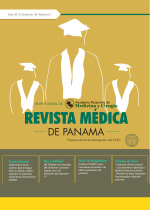Experiencia en el manejo de pacientes con Cáncer de Pulmón Avanzado ALK+ en el Instituto Oncológico Nacional de Panamá.
Autores/as
DOI:
https://doi.org/10.37980/im.journal.rmdp.2018766Resumen
[Experience in the Management of Patients with Advanced Lung Cancer Alk + at the National Oncology Institute of Panama.]
Resumen
Introducción: el rearreglo de ALK está presente en 3% - 7% de los pacientes con cáncer de pulmón avanzado. Los inhibidores de ALK constituyen el tratamiento de primera línea. El crizotinib fue el primer inhibidor aprobado. Metodología: Realizamos una revisión retrospectiva de los expedientes médicos de los pacientes con cáncer de pulmón ALK positivo desde febrero de 2014 hasta mayo de 2018. El objetivo era describir la incidencia, características clínico patológicas y determinar la supervivencia libre de progresión con el uso de crizotinib en primera línea. Resultados: De 406 pacientes evaluados, 26 resultaron positivos para ALK, obteniendo una incidencia de 6,4%. La edad media de diagnóstico fue 64 años (37 – 85) y 53,1% fueron mujeres. El 92,4% de los pacientes tenían ECOG 0 – 2. Un 43,2% con antecedente de tabaquismo. Todos los pacientes fueron diagnosticados con enfermedad al menos localmente avanzada y un 73,1% tenían enfermedad etapa IV. Al diagnóstico, 2 pacientes debutaron con metástasis cerebrales (10,3%) y ambos recibieron RTHC. Adenocarcinoma fue la histología predominante (96.3%). Un 86,9% de los pacientes iniciaron crizotinib de primera línea. La supervivencia libre de progresión fue 10.9 meses (IC 95% 7,69 – 14,12). Los efectos adversos más comunes fueron las náuseas, diarrea, disgeusia y transaminitis, en su mayoría G1. Sin toxicidad G3 o superior. La supervivencia global de los pacientes expuestos a crizotinib fue de 16.9 meses (IC 95% 11.29 – 21.50).
Conclusión: Las características de los pacientes ALK positivo, así como la PFS asociada al crizotinib de primera línea en nuestra institución, es similar a la reportada en los estudios internacionales de fase III.
Abstract
Introduction: the rearrangement of ALK is present in 3% - 7% of patients with advanced lung cancer. ALK inhibitors constitute the first line treatment. Crizotinib was the first approved inhibitor. Methodology: We conducted a retrospective review of medical records of patients with ALK positive lung cancer from February 2014 to May 2018. The objective was to describe the incidence, clinical pathological characteristics and determine progression-free survival with the use of crizotinib First line. Results: Of 406 patients evaluated, 26 were positive for ALK, obtaining an incidence of 6.4%. The mean age of diagnosis was 64 years (37 - 85) and 53.1% were women. 92.4% of patients had ECOG 0-2. 43.2% had a history of smoking. All patients were diagnosed with at least locally advanced disease and 73.1% had stage IV disease. At diagnosis, 2 patients started with brain metastases (10.3%) and both received RTHC. Adenocarcinoma was the predominant histology (96.3%). 86.9% of patients started crizotinib first line. The progression-free survival was 10.9 months (95% CI 7.69 - 14.22). The most common adverse effects were nausea, diarrhea, dysgeusia and transaminitis, mostly G1. No toxicity G3 or higher. The overall survival of patients exposed to crizotinib was 16.9 months (95% CI 11.29 - 21.50).
Conclusion: The characteristics of the positive ALK patients, as well as the PFS associated with the first line crizotinib in our institution, is similar to that reported in the international phase III studies.
Publicado
Número
Sección
Licencia
Derechos autoriales y de reproducibilidad. La Revista Médica de Panama es un ente académico, sin fines de lucro, que forma parte de la Academia Panameña de Medicina y Cirugía. Sus publicaciones son de tipo acceso gratuito de su contenido para uso individual y académico, sin restricción. Los derechos autoriales de cada artículo son retenidos por sus autores. Al Publicar en la Revista, el autor otorga Licencia permanente, exclusiva, e irrevocable a la Sociedad para la edición del manuscrito, y otorga a la empresa editorial, Infomedic International Licencia de uso de distribución, indexación y comercial exclusiva, permanente e irrevocable de su contenido y para la generación de productos y servicios derivados del mismo. En caso que el autor obtenga la licencia CC BY, el artículo y sus derivados son de libre acceso y distribución.







